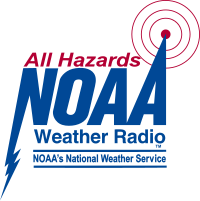 | |
| Type | Weather radio/civil emergency services |
|---|---|
| Branding | NOAA Weather Radio All Hazards |
| Country | |
| Availability | National (through radio transmitters, some commercial radio and television outlets, and Internet availability via streaming audio from other organizations) |
| Founded | by National Oceanic and Atmospheric Administration |
| Radio stations | 5-1,000W VHF-FM transmitters |
| Owner | NOAA/National Weather Service |
| Parent | National Oceanic and Atmospheric Administration |
Launch date |
|
Official website | www |
NOAA Weather Radio (NWR), also known as NOAA Weather Radio All Hazards, is an automated 24-hour network of VHF FM weather radio stations in the United States that broadcast weather information directly from a nearby National Weather Service office. The routine programming cycle includes local or regional weather forecasts, synopsis, climate summaries or zone/lake/coastal waters forecasts (when applicable). During severe conditions the cycle is shortened into: hazardous weather outlooks, short-term forecasts, special weather statements or tropical weather summaries (the first two are not normally broadcast in most offices). It occasionally broadcasts other non-weather related events such as national security statements, natural disaster information, environmental and public safety statements (such as an AMBER Alert), civil emergencies, fires, evacuation orders, and other hazards sourced from the Federal Communications Commission's (FCC) Emergency Alert System. NOAA Weather Radio uses automated broadcast technology (since 2016: Broadcast Message Handler) that allows for the recycling of segments featured in one broadcast cycle into another and more regular updating of segments to each of the transmitters. It also speeds up the warning transmitting process.
Weather radios are widely sold online and in retail stores that specialize in consumer electronics in Canada and the US. Additionally, they are readily available in many supermarkets and drugstores in the southern and midwestern US, which are particularly susceptible to severe weather—large portions of these regions are commonly referred to as "Tornado Alley".
